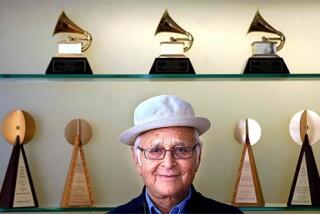Arnold M. Auerbach; Radio, TV Comedy Writer
- Share via
Arnold M. Auerbach, 86, versatile comedy writer for radio, television, film, magazines and Broadway who penned gags for such luminaries as Milton Berle and Jackie Gleason. Born in New York City and educated at Columbia University, Auerbach began his writing career in 1932 with a script for a college revue. He later contributed sketches for the Broadway revues “Call Me Mister,” “Inside USA” and “Bless You All.” Auerbach worked for comedian Fred Allen in the late 1930s and was under contract to motion picture studios Paramount and Warner Bros. in the early 1940s. He served in the Army during World War II, writing skits for the musical comedy “About Face” for Special Services. The prolific gag writer wrote for Al Jolson, Frank Sinatra, Phil Silvers and many others. He also wrote articles for such magazines as Harper’s and Saturday Review and published the books “Funny Men Don’t Laugh” and “Is That Your Best Offer?” On Monday in New York.
Earl Biss; Native American Painter
Earl Biss, 51, American Indian artist whose paintings hang in museums worldwide. Born in Renton, Wash., Biss was brought up by his grandmother on the Crow reservation in Montana. He earned scholarships to study jewelry and three-dimensional art at the Institute of American Indian Arts and oil painting at the San Francisco Art Institute. Biss traveled to Europe where he studied painting in Amsterdam and Rome and on the Mediterranean. He was a staunch advocate of oil painting, once commenting that “if an artist doesn’t paint in oils then he isn’t a real artist.” On Sunday in Santa Fe, N.M., of a stroke.
Collins Seitz; Opened White School to Blacks
Collins Seitz, 84, the first judge in the United States to order an all-white school to admit blacks. Seitz was a Chancery Court judge in Delaware when he made the ruling in 1952, commenting: “The cold hard fact is that the state in this situation discriminates against Negro children.” That case was one of four combined into Brown vs. Board of Education in which the U.S. Supreme Court made its 1954 ruling striking down racial segregation in schools. Seitz was the only trial court judge of the four who condemned the concept of separate but equal facilities for black students. After 20 years on the Chancery Court, Seitz served on the federal appellate court and retired in 1984 as chief justice of the U.S. 3rd Circuit Court of Appeals in Philadelphia. On Friday in Wilmington, Del.
More to Read
The biggest entertainment stories
Get our big stories about Hollywood, film, television, music, arts, culture and more right in your inbox as soon as they publish.
You may occasionally receive promotional content from the Los Angeles Times.










